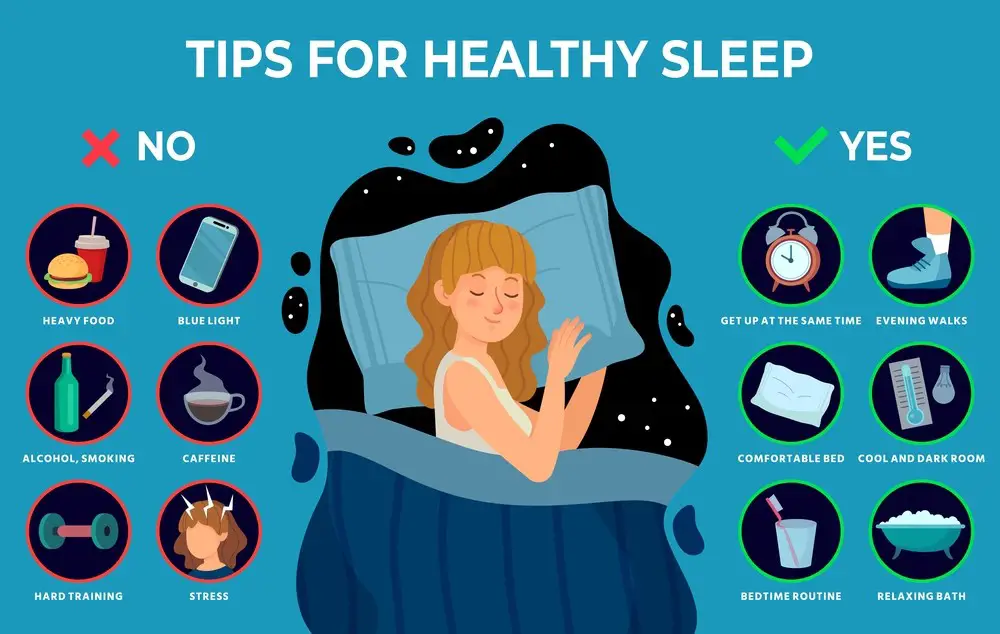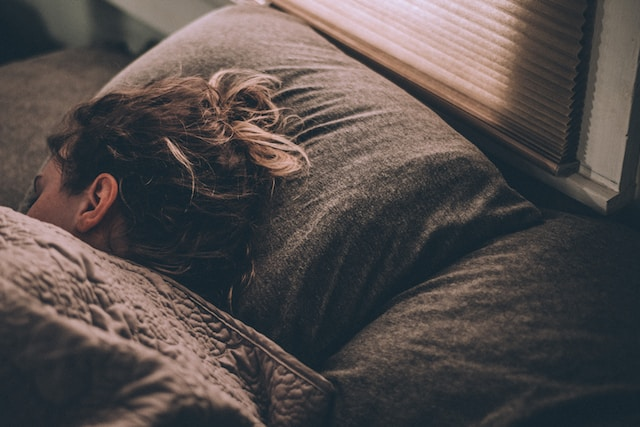As a BetterHelp affiliate, we receive compensation from BetterHelp if you purchase products or services through the links provided
Sleep is nature’s way of hitting the refresh button on our body and mind. We all know we need it, but snagging those eight hours can feel like searching for a needle in a haystack, especially when you’re beat. You know what I’m talking about: You’re utterly drained, yet as soon as your head hits the pillow, your thoughts are racing like they’re in the Indy 500. You wonder, “Why can’t I fall asleep when I’m this tired?”
Understanding why I can’t sleep even though I am bone tired has always been a challenge. The lack of sleep does more than make you dizzy; it can be a one-way ticket to Stressville, with stops at Anxiety Avenue and Mood-Swing Lane. So, let’s dive in and figure out what’s keeping you from that well-deserved rest.
.

Common Causes of Sleeplessness When Tired
- Stress and Anxiety: Stress and anxiety are the leading culprits in sleeplessness. When your mind is preoccupied with worry, relaxing and falling asleep can be challenging. Persistent stress can lead to heightened alertness that interferes with the natural sleep process.
- Poor Sleep Hygiene: Your sleep environment and habits significantly affect your ability to sleep, even when tired. Factors like excessive exposure to screens before bedtime, irregular sleep schedules, and a cluttered bedroom can disrupt your sleep-wake cycle.
Also Read: 3 Ways Cognitive Behavioral Therapy Can Improve Sleep Disorders
- Medical Conditions: Various medical conditions can interfere with your ability to sleep, such as chronic pain, allergies, asthma, and gastrointestinal issues. These conditions can cause discomfort and pain that prevent you from falling asleep or waking you up at night.
- Medications: Certain medications, particularly those that contain stimulants or affect the central nervous system, can lead to sleep disturbances as a side effect.
- Psychological Factors: Depression and post-traumatic stress disorder (PTSD) can disrupt sleep patterns. Negative thought patterns and emotional turmoil can make it difficult to unwind and drift into slumber.
- Poor Diet: Consuming heavy meals, spicy foods, or excessive alcohol close to bedtime can lead to digestive discomfort and disrupt sleep. High sugar intake can also cause fluctuations in blood sugar that wake you up at night.
- Environmental Factors: Noise, light, and temperature in your sleeping environment can affect your sleep quality. Loud sounds, bright lights, or uncomfortable temperatures can make it challenging to fall asleep and stay asleep.
- Shift Work and Jet Lag: Unpredictable work hours or frequent travel across multiple time zones can disturb your body’s natural circadian rhythm, making establishing a regular sleep routine challenging.
Also Read: Sleep Well, No Meds: 7 Expert Tips for Insomnia-Free Nights
Understanding these common causes of sleeplessness when tired is the first step toward addressing the issue effectively. Identifying the underlying factors contributing to your sleep problems can help you implement targeted solutions and make the necessary lifestyle adjustments to improve your sleep quality and overall well-being.

Factors Affecting Sleep Environment
- Stress and Anxiety
Stress and anxiety can create a hostile sleep environment by filling your mind with worry, racing thoughts, and tension. These emotional states activate the body’s “fight or flight” response, releasing stress hormones like cortisol, which can keep you awake.
- Sleep Disorders
Sleep disorders such as insomnia, sleep apnea, restless legs syndrome, and narcolepsy disrupt the natural sleep cycle and negatively impact the sleep environment. These disorders can lead to frequent awakenings, loud snoring, restless movements, or excessive daytime sleepiness.
- Lifestyle Factors
Lifestyle factors encompass many habits, including irregular sleep schedules, excessive alcohol consumption, lack of physical activity, and poor diet. These choices can create a sleep environment that is less conducive to restful sleep. An unhealthy lifestyle can interfere with your circadian rhythm, making it difficult to fall asleep and wake up at consistent times.
Also Read: 7 Sleep Mistakes Most People Make

- Caffeine and Stimulants
Caffeine, nicotine, and other stimulants can disrupt sleep by interfering with your body’s ability to relax. These substances stimulate the central nervous system, increase heart rate, and block the action of sleep-inducing chemicals.
- Technology and Screen Time
Before bedtime, exposure to screens, such as smartphones, tablets, and computers, can interfere with the sleep environment by emitting blue light. This type of light can suppress melatonin production, a hormone that regulates sleep-wake cycles.
Addressing these factors that affect the sleep environment is essential for promoting healthy sleep patterns. Identifying and mitigating these issues can create a more conducive environment for restorative sleep and ultimately improve your overall well-being.
Medical Conditions Contributing To Sleep Problems
Here are some common medical conditions that can negatively impact sleep:
- Insomnia: Insomnia is a sleep disorder characterized by difficulty falling asleep, staying asleep, or experiencing restorative sleep. Various factors, including stress, anxiety, depression, chronic pain, or certain medications can cause it.
- Sleep Apnea: Sleep apnea is a health condition characterized by recurring interruptions and restarts in a person’s breathing throughout their sleep. This condition can manifest as noisy snoring, moments of gasping for air, and frequent awakenings, which, in turn, lead to disrupted sleep patterns and heightened daytime fatigue.
- Restless Legs Syndrome (RLS): RLS is a neurological condition marked by unpleasant leg sensations, often described as feelings of creeping, crawling, or tingling. These sensations intensify at rest, leading to difficulties initiating or maintaining sleep.

- Narcolepsy: Narcolepsy is a persistent neurological condition that disrupts the brain’s capacity to manage the natural sleep-wake patterns. Those with narcolepsy may encounter abrupt and involuntary bouts of excessive daytime drowsiness, along with unexpected sleep episodes occurring during everyday tasks.
- Chronic Pain: Conditions such as arthritis, fibromyalgia, or chronic headaches can cause pain that disrupts sleep. Pain can make it difficult to find a comfortable sleeping position or can wake individuals up during the night.
- Gastroesophageal Reflux Disease (GERD): GERD is a gastrointestinal condition where stomach acid regurgitates into the esophagus, resulting in heartburn and discomfort, especially when reclined. Nocturnal symptoms of GERD can disrupt sleep.
- Asthma: Asthma, a chronic respiratory condition, can worsen at night, leading to coughing, wheezing, and breathlessness. These symptoms can disrupt sleep and reduce its quality.
- Neurological Disorders: Conditions such as Parkinson’s disease or multiple sclerosis can disrupt sleep patterns due to physical discomfort or neurological changes that affect sleep regulation.
Managing the medical condition often improves sleep quality and overall well-being. If you suspect a medical condition contributes to your sleep problems, consult a healthcare professional for proper assessment and guidance.

Strategies to Improve Sleep Quality
These are various strategies and practices that can significantly improve sleep quality.
Relaxation techniques like deep breathing exercises, progressive muscle relaxation, and mindfulness meditation can help calm the mind and reduce stress and anxiety, making it easier to fall asleep.
- Sleep Hygiene Practices
Sleep hygiene pertains to the adoption of routines and actions that support the establishment of healthy sleep patterns. These measures include adhering to a regular sleep timetable, cultivating a cozy sleep setting, and refraining from stimulants and electronic screens in the hours leading up to bedtime.
- Bedtime Routine
Creating a regular bedtime regimen tells your body it’s time to relax and get ready for sleep. This routine can include reading, enjoying a warm bath, or engaging in relaxation exercises.

- Exercise and Physical Activity
Regular physical activity can promote better sleep, but it’s essential to time exercise appropriately. Engaging in vigorous exercise too close to bedtime can be stimulating, so aim to complete workouts at least a few hours before sleep.
- Dietary Choices
Avoiding large meals, spicy foods, caffeine, and alcohol close to bedtime can help prevent digestive discomfort and sleep disruption. Instead, opt for lighter, sleep-friendly snacks if necessary.
Also Read: Best Sleeping Position for Anxiety: Top Tips for a Calm Night’s Slumber
- Sleep Aids and Supplements
Some individuals may benefit from sleep aids or supplements, but it’s crucial to use them judiciously and under the guidance of a healthcare provider. These may include over-the-counter sleep medications, herbal remedies, or melatonin supplements.
Keep in mind that consistency and patience are essential when implementing these changes. Consulting with a healthcare provider or sleep specialist can be valuable, especially if you continue to experience persistent sleep problems despite trying these strategies.

When to Seek Medical Attention
If you’re consistently lying awake night after night, tossing and turning, it might be more than just typical insomnia—it could be time to consult a healthcare professional. Some signs that you should seek medical advice include:
- Sleeplessness lasting more than two weeks
- Daytime fatigue affecting work or relationships
- You’ve tried natural remedies with no success
- Sleep disruptions are causing significant mood swings or anxiety
Remember, a consistent lack of sleep can lead to a host of health issues, both mental and physical. It’s not something to shrug off.
Setting Goals and Monitoring Progress
Want to conquer the sleep game? Then, it’s time to set some realistic, achievable goals. Start by:
- Setting a consistent sleep schedule: Go to bed and wake up simultaneously, even on weekends.
- Creating a bedtime ritual: Whether reading, meditating, or a warm bath, find what helps you wind down.
- Limiting screen time: Blue light from screens can mess with your sleep hormones.
Use a sleep tracker or journal to keep tabs on your progress. Not only will it highlight what’s working, but it can also provide useful insights for your healthcare provider if you need medical advice.
When to Consider Sleep Aids
Popping a pill might seem like the easiest solution to your sleep woes, but it should generally be a last resort. Medications often come with a string of side effects and the potential for dependency. However, medication might be a sensible next step if you’ve tried lifestyle changes and consulted a healthcare provider. Some points to consider:
- Always consult with a healthcare provider for a proper diagnosis and treatment plan.
- Try short-term prescriptions first, under a doctor’s supervision.
- Continuously assess your need for medication, especially if you’re making lifestyle changes.
We all deserve the gift of a good night’s sleep, so let’s be proactive and strategic in chasing those Z’s!
Frequently Asked Questions (FAQs)

How many hours of sleep should I aim for each night?
Aim for 7-9 hours of sleep each night for optimal well-being.
When should I consider seeking professional help for my sleep problems?
Consider seeking professional help for sleep problems if they persist despite trying self-help strategies and significantly affect your daily life.
Can sleeplessness when tired be a sign of an underlying medical issue?
Yes, sleeplessness when tired can be a sign of an underlying medical issue, such as sleep disorders or certain medical conditions. Consulting a healthcare professional is advisable in such cases.
- Left Arm Pain and Anxiety: Understanding the Relationship - November 23, 2023
- Anxiety Paralysis: Coping with Overwhelming Stress - November 23, 2023
- Anxious vs. Nervous: Differentiating Emotions and Responses - November 15, 2023
This site contains affiliate links to products. We will receive a commission for purchases made through these links.




